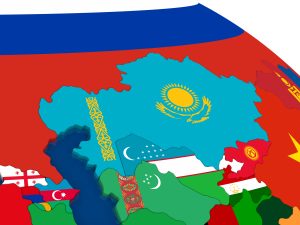Russia’s invasion of Ukraine in late February caught many in Central Asia by surprise. What is less surprising are the responses of regional governments and the immediate affects of the invasion — and the ensuing international sanctions on Russia — across the Central Asian region. Central Asia is linked to Russia socially and economically, and politically too, in ways that are not easy or quick to disentangle. There’s not much to be gained by condemning Russia, but also not much to be gained by supporting Moscow’s actions outright either. Regional governments are striving for neutrality, though to differing degrees.
More critically, as we’ve covered here at The Diplomat, the invasion has kicked off an economic crisis in the wider Eurasian region, and likely an employment crisis too as millions of Central Asian migrant workers feel the ruble tumble and job prospects dry up. That, in turn, may have social and political consequences. The shape of those consequences, however, is inextricably tied to the progress of the war, how long it lasts, and how it ends.
Russian President Vladimir Putin’s framing of the invasion of Ukraine as correcting historical mistakes — and his dismissal of Ukrainian statehood as “fiction” — echoes loudly in Central Asia. If Putin’s ambitions are rooted in the boundaries of the former Soviet Union, Central Asia has cause to worry.
To help us continue to process the impact of the Russian invasion of Ukraine on Central Asia, we spoke to Erica Marat, an associate professor and chair of the Regional and Analytical Studies Department at the National Defense University in Washington, D.C.
Did the Russian invasion of Ukraine late last month come as a surprise in Central Asia?
Yes, just in the rest of the world, many Central Asians were caught by surprise. Most analysts expected a limited military campaign in Donetsk and Luhansk at the most, not a full-scale invasion.
What have the region’s diplomatic responses been? Do you think these responses are adequate?
The reaction differs across the region. Kazakhstan declared neutrality, but uses every chance to show sympathy with the Ukrainians by allowing peaceful anti-war demonstrations and sending humanitarian aid. The Russian war in Ukraine helped Kazakh authorities to divert attention from domestic repercussions of the deadly policy violence against protesters. Kyrgyzstan remains neutral. Uzbekistan is mostly silent. Tajikistan and Turkmenistan likely hope Putin remains in power and patronage relations continue amid the ongoing dynastic transfers of power in both countries.
What does the invasion of Ukraine by Russia tell us about the status quo in the post-Soviet period? Should other former Soviet states, including in Central Asia, be concerned? Why or why not?
Everyone should be concerned. The devastating economic impact on Russia’s neighbors is particularly strong. Kazakhstan is part of the same USSR 2.0 narrative in Putin’s previous statements and the rhetoric of Russian nationalists. Should Putin remain in power, Kazakhstan’s northern and western territories may be his next target for reconstruction of the empire.
How will the growing weight of Western sanctions impact Central Asia economically and politically?
The fallout is mostly from Russia’s increased protectionism of its domestic market with grain and food products embargoed from export to Central Asia. Labor migrant remittances will decrease sharply, sending economies into crisis mode.
There have been some pro-Ukraine protests in Kazakhstan and Kyrgyzstan and smaller showings of support for Russia. What do you make of the authorities allowing these rallies to go ahead?
For Kazakhstan the protests communicate Nur-Sultan’s foreign policy. Kazakhstan would never allow a similar gathering against China. In Kyrgyzstan, the protest is just part of political life.
Do you think the Russian invasion of Ukraine will influence the balance between Russia and China in Central Asia?
Chinese economic influence will continue to be important, especially in replacing imports from Russia. But countries are now aware of the devastating implications of Putin’s fascist rhetoric and imagine they may be coerced into the Kremlin’s submission even more.

































